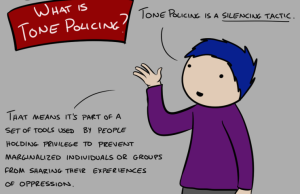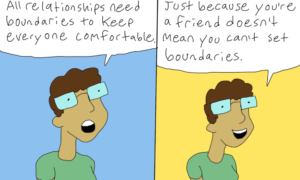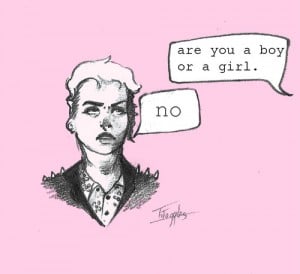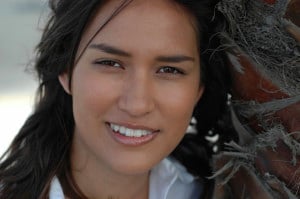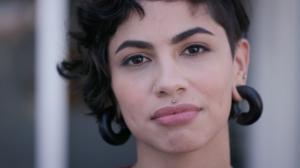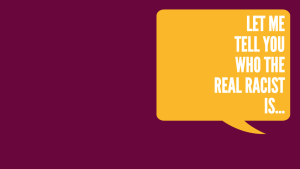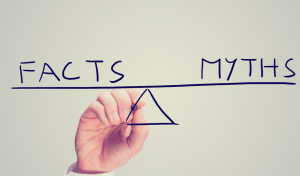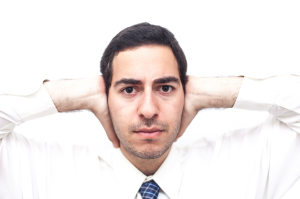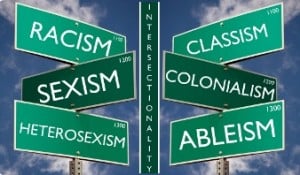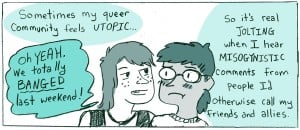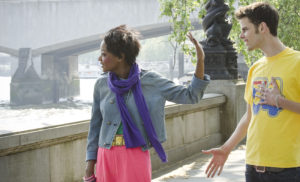
A person tries to talk to another person, who, frustrated, is making the “talk-to-the-hand” gesture.
Yes, here we go again with a topic that often sets many of my white, would-be allies ablaze.
We all know the N-word is a sensitive subject. While there’s no unanimous agreement on who’s allowed to use it, white people are often criticized for saying or wanting to say it. Many people think it’s unfair that black people get a pass on saying it while others don’t – especially when it seems black people are allowed to say slurs like “cracker” and “honky” without as much critique.
It doesn’t seem fair.
When I try to put myself in your shoes, I see where you’re coming from (kind of). How come Shae, who is black, can say “n*gga” – but hypothetical white Shae can’t? As an added bonus, black Shae also gets to say white slurs, too?
In the game of “who gets to say certain racial slurs,” it seems like white people always lose. In this arena, if you’re a white person, you might feel constantly policed and picked on.
With my hand over my heart, I can assure you this is not the black community’s way of getting back at white people.
This isn’t about telling white people what they can and cannot do. Nor is it about giving black folks preferential treatment or amends for the historical use of the N-word.
Though, I’m still waiting on those monetary reparations that the UN said the government owes us. I’m willing to trade my ability to say the N-word without reprimand for said reparations. I shouldn’t have to – but that’s a different story for a different day.
With the N-word versus “cracker” debate, we have to discuss the history and power relations at play. That’s what this is really about. So we’ll need to travel back in time to begin to understand why white people saying the N-word and black people saying “cracker” are not the same.
1. History Shows the Inequality Between the Two Words
The N-word is derived from terms like negro, nigre, and niger in Spanish and French. The word was used to describe people of African descent because of their dark skin, and over time, it became a derogatory term to for black people. The N-word is tied to horrendous occurrences in our nation’s past and recent history and used to oppress black people for centuries.
To dive deeper into this discussion, let’s take a trip to the antebellum South.
Not your favorite place? I wouldn’t exactly call this my scene, either. We won’t spend too much time here, so let’s look around quickly.
Can you hear what that slave master on the plantation in front of us is yelling at that slave? What’s that he’s saying in between each cracking of the whip against that man’s bare back?
Yes, there’s that N-word.
Okay, take a breath here. I know many folks don’t like when black people play the “slavery card” because it makes them feel uncomfortable or guilty.
But this isn’t a guilt trip. I never want a reader to feel guilty, as guilt is not a helpful reaction. I’m just providing a bit of context. For the sake of figuring out the difference between the N-word and “cracker,” we have to talk about slavery.
Now, let’s get out of this time period quickly, before someone starts asking if I’m for sale.
Flash forward to the 1960s in New Orleans.
This is pretty recent for many of us. It’s recent enough for me to locate some not-so-distant relatives. I’ve got some great-aunts and -uncles in the area we can visit if you folks want to stop for tea later on.
In the meantime, check out this elementary school to the left. You see that little girl being escorted to school by US marshals? That’s six-year-old Ruby Bridges, and she’s integrating a school. How cool is that!
Wait. What is that mob of white people shouting at her? Peppered between their anti-integration hollering is, once again, the N-word.
This isn’t exactly a time I want to stick around in either, so let’s dip. Also, we’re going to skip the visit to my family’s home for tea. Now that I think about it, I highly doubt their neighborhood is integrated. We’ve already witnessed two uncomfortable (to put it lightly) experiences from the past, so let’s not make it a third.
Now, as for the history of the term cracker: Remember that slave owner who was yelling the N-word while beating that slave? That’s why he’s called “cracker.” It’s believed that term referred to what white people did with “whips,” cracking them on the bodies of livestock and slaves. In this context, “cracker” is a word that refers to the oppressor.
Historically, “cracker” has never been spat at white people who get their fingers cut off because they tried to illegally read.
“Cracker” has not been a common last word white people hear before facing their death from a race-based hate crime.
And there’s never been a time in history where a group of people collectively decided that the white race was inferior and therefore deserving of violence because of they were “crackers.”
The same cannot be said about the N-word.
Sure, the N-word isn’t always used in the same context anymore, and “cracker” no longer refers to a slave-master anymore – but I’d caution anyone who wants to ignore this history of these words.
Historical context matters. Slavery happened. Jim Crow happened. Ignoring that is erasing hundreds of years of history and forgetting that this history plays a role in present-day race relations in our country.
So, now that we understand from a historical perspective why the N-word is such a loaded term compared to cracker, let’s talk about these words in the present day.
2. Current Power Dynamics Between the Words Aren’t Equal
Slavery and Jim Crow have seemingly faded out and been replaced with current racial injustices including mass incarceration, voter suppression, gentrification, and the poisoning and threatening of people of color’s water supply in Flint and at Standing Rock.
The ugly truth is that despite our nation’s progress, racial oppression is still alive and well in our society. That oppression coexists with privilege.
As a white person, you benefit from being white in our society, especially when it comes to interactions with the police, access to careers, and many other benefits. Though you may experience other forms of oppression, you can generally go about your day without being oppressed because of your race.
That gives you some power in this country – a type power that black people do not have.
So when you use the N-word (yes, even with an “a” in place of the “er”), you’re using it from a place of power and privilege. You’re using a word that has a direct link to oppression without experiencing that oppression.
Hearing or seeing the N-word doesn’t ruin your day. It doesn’t remind you of a time when your ancestors were viewed as animals. It doesn’t cause you pain. It doesn’t make you feel oppressed because you’re not racially oppressed.
The funny (not-so-funny) thing with white people saying the N-word is that many of the folks who want to say it so bad are the same folks are hesitant to say the words “Black Lives Matter.”
They want to say the N-word so bad, but opt out of speaking out against racial injustice and fighting alongside black folks in our attempts to dismantle the structures in society that seek to marginalize, imprison, suppress, and kill us.
You don’t have to fight alongside us if you don’t want to – because your day-to-day life isn’t as impacted by racial injustice. That’s where that power dynamic sometimes hurts the most.
Privilege and power allow white people to pick and choose when they want to “be down,” like when they’re singing the words to YG’s song “My Nigga,” and when they want to opt out, like when folks look the other way or make excuses when another cop is standing over a black kid’s dead body.
Your position as a white person makes using the N-word a harmful flex of power.
So what about the power dynamics involved when black people saying “cracker?”
3. Using ‘Cracker’ Isn’t Reverse Racism
Short answer: There isn’t a power dynamic at play when black folks say “cracker.”
Black people don’t have the power that comes with privilege in matters related to racism. We don’t have power over white people in matters of race because racism targets us while sparing our white friends.
The most black people can do is laugh at the common white people jokes about lack of seasoning and rhythm. But there’s a difference between racism and pettiness.
Racism may be mean, but meanness isn’t always racism. The difference lies in who has the power and privilege, which in this case, is still white people.
The word “cracker” at its absolute worst is a mean insult, kind of like being called a “white loser” on the school yard. If a black person calls you a cracker, you can pick up your ball and go home if you want to, but you don’t get to cry “racism.” At most, you’re a victim of bullying. That’s still very upsetting, but it isn’t racism.
I’m not going to harp on and on about how reverse racism or discrimination against white people isn’t a thing. I frequent the Everyday Feminism Facebook page, and I see a lot of folks demanding that reverse racism is real because one time a black person called them a “honky.” Then people of color and white allies comment with evidence and additional articles on the subject – which many offended white folks refuse to read.
Honestly, I’m tired of the back and forth about this, y’all.
I know that some people aren’t going to come around, while others genuinely don’t understand or haven’t been presented with the material yet. If you need more explanation on this subject, there’s more information here, here, and here.
4. Context Doesn’t Matter
People often say that context matters when a white person uses the N-word. Maybe they are only using the “a” rather than the “er,” maybe their two black friends don’t mind if they say it, or maybe they just want to sing along to their favorite songs.
But because you cannot erase the historical context or power dynamics at play when white people use the N-word, context really doesn’t matter.
The truth is, no matter where or how you use the N-word, it can still be hurtful to the people around you. If you’re in a public space, you never know who is within earshot.
And if you are truly 100% alone, it may not hurt anyone’s feelings, but your use of the N-word still a flexing of your white privilege.
***
In discussions on the N-word, “cracker,” or on any other discussion on race, we must make sure the focus is on supporting the people who are fighting for inequality, not focusing on white people’s feelings.
Any focus on white people’s feelings derails efforts for justice and equality. I understand that discussions on race are sometimes uncomfortable. Being called out on your privilege sometimes feels embarrassing. But sitting in that discomfort gives you the opportunity to learn something new, see another perspective, and become a better ally.
So before you open your mouth, lift your hands, or start hammering away at your keyboard to explain how something isn’t fair or how you feel attacked, think about how you might be making yourself the focus of a discussion at the expense of progress for a marginalized group.
At the end of the day, if we’re really about social change, we have to learn to listen and understand how our actions support or oppress one another. If they are oppressive, we have to learn how to make changes.
So, for the love of social change, please give up this strange desire to want to say the N-word.
[do_widget id=’text-101′]
Shae Collins is a Contributing Writer for Everyday Feminism. She enjoys educating and uplifting by aiming a black feminist lens at pop culture on her blog. She’s been published in EBONY, Ms. Magazine, For Harriet, and Blavity. Laugh with her on Twitter @ShaeCWrites.
Search our 3000+ articles!
Read our articles about:
Our online racial justice training
Used by hundreds of universities, non-profits, and businesses.
Click to learn more





